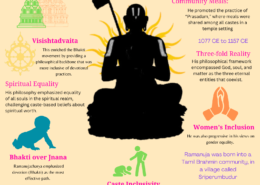Examine how poetry embodies the teachings of Sufi and Bhakti saints.
The Bhakti and Sufi movement developed as a result of prevailing sociopolitical conditions of the time. It emerged against the caste system and orthodox rituals and had their influence on the social structure and cultural history of the India during medieval times. These are some sociopolitical contRead more
The Bhakti and Sufi movement developed as a result of prevailing sociopolitical conditions of the time. It emerged against the caste system and orthodox rituals and had their influence on the social structure and cultural history of the India during medieval times.
These are some sociopolitical contexts that led to the development of these movements:
- Rigid orthodox practices: Medieval India society had a range of rigid orthodox practices from unnecessary rituals and religious practices. It had somewhat excluded the common man from accessibility to religion and they were in a need of an alternative form of religion.
- Contribution of Socio-religious reformers: There was emergence of socio-religious reformers who contributed widely to reform the evils of the both Hindu and Muslim society. Some of these important saints among bhakti movements are Ramanuja, Kabir, Guru Nanak, Eknath and among Sufi movements are Nizamuddin Auliya and Sheikh Nasiruddin Mahmud.
- Rigid caste system: Caste system in medieval India had created a rigid hierarchy of marginalized lower castes and untouchables which led Bhakti and Sufi movement to advocate for spiritual equality and inclusivity.
- Coming of Turks: Turks had deprived the Brahmans of their temple wealth and state patronage. The loss of power and influence by the Brahmans and the new political situation ultimately created conditions for the rise of the popular monotheistic movements in India.
Thus, Bhakti and Sufi movement was a social revolution which had long lasting impact on every dimension of the social and political life in the Indian subcontinent. It led to foundation of a liberal Indian society with emerging spiritual ideas without any institutionalised superstructure.
See less


Poetry played a vital role in expressing the philosophies of Bhakti and Sufi saints, serving as a powerful medium for their spiritual messages and social critiques. Here’s an analysis of this role: 1. Accessibility of Spiritual Teachings Vernacular Languages: Many Bhakti and Sufi poets wrote in locaRead more
Poetry played a vital role in expressing the philosophies of Bhakti and Sufi saints, serving as a powerful medium for their spiritual messages and social critiques. Here’s an analysis of this role:
1. Accessibility of Spiritual Teachings
2. Emotional Expression
3. Philosophical Insights
4. Social Critique and Reform
5. Ritual and Practice
6. Legacy and Influence
Conclusion
Poetry served as a crucial medium for Bhakti and Sufi saints to articulate their philosophies, making complex spiritual ideas accessible and emotionally resonant. Through their verses, these poets challenged social norms, promoted equality, and fostered a deep sense of connection to the divine. The enduring impact of their poetry continues to inspire and guide individuals in their spiritual journeys and social consciousness.
See less